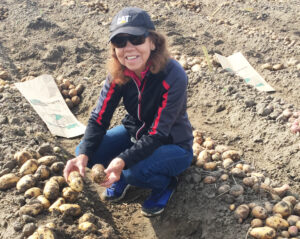One of the most significant ways to recognize outstanding contributions to the potato industry and to our organization, The Potato Association of America, is the awarding of Honorary Life Membership (HLM). This is the highest award bestowed upon an individual by the PAA. Each year at the Annual Meeting of the PAA this award is given to deserving individuals and is considered by many attendees the highlight of the banquet.
Paul Bethke
 Paul, like myself, did not have a background in potato before starting his position in the USDA, but it quickly became obvious to me that he was intrigued by the challenges that this peculiar plant presented.
Paul, like myself, did not have a background in potato before starting his position in the USDA, but it quickly became obvious to me that he was intrigued by the challenges that this peculiar plant presented.
Paul led several research projects related to potato physiology during his 20 years with the USDA and each has had tremendous impact on the potato community. Most notable was his collaborative work on cold-induced sweetening and silencing of acid invertase with Jiming Jiang, and his study of potato wild relatives for their ability to produce reduced levels of sugars during cold storage. He also has done considerable work on understanding the physiological mechanisms that lead to stem-end defect. Combined, this work led to new strategies to improve potato germplasm to combat imperfections in chip quality. Paul has also been a strong advocate for revolutionizing potato breeding through the development of a diploid, hybrid breeding system. Several years ago, Paul was instrumental in initiating and coordinating efforts among potato geneticists and breeders in this monumental and pivotal moment in the history of potato. This project has spanned several research groups in many states in the US. Paul and I have collaborated on many projects over the years and we have co authored several review papers on various topics related to potato genetics and germplasm improvement. As you may know, it is not always easy to initiate, organize, and follow through on review papers with multiple authors. However, Paul consistently took the lead on these projects and was essential for offering ideas for the structure of the papers and keeping authors on schedule with their contributions.
It is relatively easy to find documents of Paul’s research accomplishments through manuscripts, so I would also like to include a summary of his outstanding work as an advocate for the potato industry to the general public. Paul and I have participated in many (3-4 a year) outreach events together over the past 20 years. I am always amazed by his ability to talk to just about anyone about potatoes. He has a seemingly endless knowledge-bank of potato trivia and facts. He always manages to come up with a way to engage people in conversation, get them to ask questions, and make sure that they leave the conversation having learned something about potatoes. Engaging people with banter and seemingly simple questions, like holding up a potato to a classroom of teenagers and asking, “Is this alive?”, are effective parts of Paul’s strategy. Many of you have probably observed this in his interactions with Haynes graduate student competition winners at the annual meeting awards banquets, which are always a highlight of the meetings. This type of engagement spills over into his interactions with other scientists where Paul has a knack for asking questions that make you really think about the work that you are doing, or the results that you are presenting, and how your results fit into the ‘bigger picture’.
Many members of the PAA are aware of Paul’s considerable contributions to the Association. He served as Director from 2017-2019 and was very active within the Physiology Section and as an Editorial Board member for AJPR. Most prominent was his role as member and chair of the Frank L. Haynes student competition. As chair, Paul oversaw tremendous growth of the competition, primarily due to his diligence and commitment. He lobbied for an increased number and size of student awards. This, along with his jovial but thoughtful interaction with the awardees at the annual banquets, amplified student interest in competition participation.
During his career, Paul has fully embraced the vision of the PAA by being a leading voice for potato science, partnering with domes,c and international professionals, and engaging with the public to support the potato industry.
Eugenia Banks
Dr Eugenia Banks was born and raised in Chile. Her father was an extension agent and later became the head of extension for the Department of Agriculture of Chile. Eugenia admired her father and as a child, often joined him in his work across Chile. Eugenia had the dream of following in her Dad’s footsteps. Eugenia completed her BSc in Agriculture in Chile. She was fortunate to come to the University of Guelph where she completed her MSc and PhD degrees in Plant pathology. While studying she got to know and later married her class mate Paul Banks. After some time being in France, she returned to Ontario and was initially hired to work as a Potato Pest management Specialist with the Ontario Ministry of Agriculture, Food and Rural Affairs (OMAFRA) in September 1990. By 1997 Eugenia was promoted to being the overall Potato Specialist for the OMAFRA. In 2015 Eugenia became the Potato Specialist/researcher for the Ontario Potato Board on a “Pro Bono” basis.
Eugenia was initially not very familiar with the potato crop. So she was determined to not only get to know the potato growers but also their challenges. Through daily visits with farmers she soon learned what the farmers needs and priorities were. From the start she was clearly a woman who loved to be in the field and together with growers learn about the different aspects of growing a potato crop. Her passion was evident from the start and she soon garnered the respect of all, even though she was a woman and from a far away country by birth.
The Colorado Potato Beetle (CPB) was her first huge challenge. The CPB was the number 1 issues facing all growers in Ontario. Insecticides were no longer effective and populations were exploding in many regions. Eugenia immediately started doing the dip tests to see which insecticides may have some efficacy. She encouraged growers to dig trenches on the edge of fields and line them with plastic to prevent the migration from last years potato crop next door to enter the present growing crop. The use of propane flamers and vacuum pumps were also tried. Eugenia worked tirelessly with many growers including our farm in a multifaceted approach to managing the CPB. Eugenia was also the one that lead us growers to seek emergency registration for the systemic insecticide Admire. This was accomplished in 1995 and totally changed the CPB situation to one that was now under control!
A2 strain of Late Blight arrives in 1996! With the solution to one production constraint removed, another more insidious problem arrives! The 1996 growing season was one with plenty of rain and late blight spread rapidly and caused much foliar and tuber damage on many farms. Eugenia took on the challenge of developing an effective fungicide control strategy with both contact and systemic fungicides used in the farmers spray program. There were many on farm trials with successful control with early and frequent sprays needed. The late blight monitoring program continues in several locations across Ontario where Eugenia has spore traps erected which are taken weekly for detection of spores. Alerts are sent to all growers weekly of the results of these readings. Once a spore trap confirms a positive result, growers in the immediate area are notified to take extra control measures with fungicide sprays.
Common Scab was increasingly becoming a problem with many growers. Eugenia took up the challenge to manage this disease through biocontrol methods with various recommended products from various sources. These had little or no economic benefit. Eugenia established a research plot on a heavily infected scab field where for many years she conducted scab trials with varieties from many sources in North America and Europe. I personally was able to do my scab trials there too with tuberfamilies from crosses we had with scab tolerant parents. It was great to collaborate with her in evaluating lots of germplasm at this site and later we were forced to move to another site and continued this work. In 2007, Eugenia organized the first North American Common Scab conference in Guelph. Over 200 attendees, both farmers, researchers and extension specialists came from across North America. With the benefits of the outcome of the conference a multi-pronged approach enabled farmers to better manage their rotation crops, choose tolerant to scab varieties and successfully grow and market most potatoes produced even from once scabby fields. Potato variety trials cooperating with many private and public breeding programs. The scab plots attracted many breeders to have their selections evaluated for scab resistance and this lead to greater cooperation with numerous trials for many breeders across locations in farmers fields with potato varieties for different purposes and assessments for various diseases and adaptation. Cooperating institutions include: HZPC; AGRICO; Solanum International; universities including Wisconsin, Michigan State, Cornell and Guelph; Quebec Parmentier, Privar Farm Inc and Sunrise Potato.
Training Scouts for farmers and input suppliers. Eugenia initiated this annual program in 1991 with a training session every year in late May. University students who had summer jobs and grower family members would join this very practical course on detecting pests and diseases and determining thresholds and what control methods were advisable for the growers to use. Hundreds of scouts were trained through these courses. During the 2 years of the Covid pandemic with the course being on line, Eugenia had hundreds join from around the world! It was truly amazing! Integrated Pest Management (IPM) is a major component of the scout training. An IPM manual along with fact sheets and related articles fully equip all who have received the training and the manual. This program has continued for 32 years!
Potato Field Guide: Insects, diseases and defects. Eugenia soon recognized that growers would greatly benefit from a handy field guide that they could use when questions arose about certain problems arising in their crops related to pests, diseases and defects. Eugenia wrote and put together detailed scientifically correct Potato Field Guide with a collection of 554 pictures. It is widely used by growers,Scouts and laypeople in Ontario as well as globally. She had experts in various areas of specialization review the various sections of the Book. She received funding from various sources besides from OMAFRA. It was first published in 2004 with over 5,000 copies published in several editions distributed to all who requested a copy. It is now available online as a PDF (https://spudsmart.com/wp-content/uploads/2022/06/Potato-Field-Guide.pdf).
Annual Ontario Potato Conference. Eugenia launched this annual event in 1998 and continues with a large group of growers and industry people participating. Between 250 and 275 attend this event annually. Eugenia had the unique ability to choose the correct topics of concern to growers and brings experts from across North America and even from Europe to speak on the important topics of the day. The accompanying Trade show attracts around 40 exhibitors annually.
Annual Potato Field Day. Since 1998 this is a big event that occurs annually in late August prior to the major potato harvest. Growers and industry people come together to see potato displays, new equipment and enjoy a great barbecued meal with lots of fellowship. It is a festive occasion for which Eugenia finds sponsors to cover all the costs.
Weekly Update Newsletter for growers. Eugenia continuously sends out local or international news briefs to her mailing list. These updates are invaluable for the growers.
Invited regular Articles for Spud Smart magazine. Eugenia writes a quarterly one page article for the Canadian potato magazine Spud Smart. Her articles often appear in other magazines far and wide in North America.
Conference Speaker. Eugenia has been an invited speaker at numerous conferences across North America. She was also a speaker at the World Potato Congress in Cusco Peru in 2018 on her work with detecting Late blight and its control.
Membership in the PAA. Eugenia joined the PAA in 1995 and remains an active member.
Some individual quotes of how Eugenia impacted them and the potato industry in Ontario.
• Mark VanOostrum, Potato supplier and Quality Manager, WD Potato Ltd: “It’s been a tremendous honor to work along with Eugenia for almost 20 years. Started out as a young agronomist from away with some PEI potato experience coming to Ontario was a different world. Eugenia opened up and shared and taught me so much. Always willing to teach and share day or night and weekends included! Her dedication to the industry and growers is unmatched even in retirement she’s seen around all the major growing areas often the last one to leave Beeton on a Friday night during harvest. Research and extension are in Eugenia’s DNA. If I found that unknown pest, Eugenia worked tirelessly to find an answer whether it was numerous lab tests or calling on her peers from all over the world. The potato growers have benefited greatly from her detailed work with on common scab treatments and variety trialing. The Ontario Potato Conference in the winter and the summer Field Day have grown from a local group of growers to one of the largest well attended potato grower meeting in all of Canada, not bad for a small Potato province!”
• Kate VanderZaag, Partner in P&K VanderZaag Farms Ltd: “Eugenia Banks has had a massive impact on our commercial chipstock potato farm. Every time we have an issue with any aspect of our farm we turn to her for advice. She comes to the field, to the storage, to our home or to our shop, wherever we are. She encourages people to come to her plots, see new varieties and techniques for dealing with pest problems. Her vast knowledge and love of the potato plant is exceptional. We would be lost without her. She is our ‘go to’ person!!”
• Harry Bradley, owner of CJ Bradley farms and Chair of the Ontario Potato Process Board: “Eugenia Banks is a mountain of knowledge which she shares generously with all growers in the potato sector of Ontario.”
• Shawn Brenn, partner in Brenn Farms and Chair of the Ontario Potato Board and Ontario Fruits and Vegetables Growers Association: “Eugenia’s knowledge and expertise is profound. You will not find a more engaged individual that devotes so much of her time for the benefit of
growers!”
Summary of her impact on the Potato industry in Ontario. Eugenia has a passion for excellence in her work of promoting sustainable potato production by growers. She is extremely dedicated to her role of helping growers. This is also her passion! She literally loves her work and is tirelessly doing it! Eugenia is also a friend to many in the potato world. She had developed a deep trust with many growers, who feel free to call on her and vice versa.
Jonathon Whitworth

Jonathan’s dedication to the potato industry by advancing the science of potato plant pathology, particularly regarding potato viruses, has had a dramatic impact on the potato industry locally, nationally, and internationally, and unequivocally qualify him for this award. His accomplishments are apparent from the many honors, awards, and invitations that he has received during his career from groups both in the US and abroad. In addition to his many awards and honors, Jonathan. has authored or co-authored numerous articles and presentations that have Despite not having any teaching requirements associated with his positions, Jonathan has been formally invited to sit on several graduate student and post-doctoral committees and has informally influenced and mentored many others.
Jonathan has been a strong and active supporter of the Potato Association of America. He actively participates and has been a key committee member in several sections, the graduate student competition judging committee, symposiums, and other organizational committees. Jonathan currently serves on the board of directors and as senior editor for the plant pathology section of the journal. His participation in the Potato Association of America has strengthened the organization and inspired others to be active in the society.
